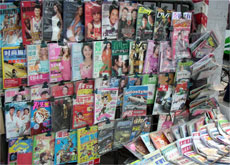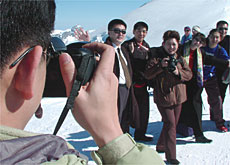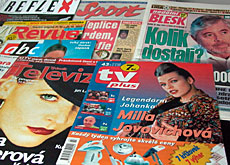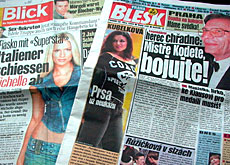Swiss publisher makes inroads in China

Cookery, entertainment, economics and tourism – these are the key topics used by Switzerland’s largest publisher, Ringier, to gain access to the Chinese media market.
The sector is still under state control, but there is increasing freedom. And there has been an explosion in advertising.
On the streets, a thousand new titles have blossomed. Magazines are piled on pavement stalls, or laid out more or less neatly on the ubiquitous newsstands.
It is a long time since the Chinese read nothing but the austere party broadsheets. They are increasingly indulging in colourful glossy magazines, devoted to the gods of leisure: fashion and beauty, cars, and music of every kind.
The expanding market is trying to adapt to the demands of the younger generation, which is wealthier and less politicized. “But the quality of these colourful glossies often leaves much to be desired,” comments Tim Murray, Ringier’s representative in Beijing.
“In this respect, the sector still has a long way to go,” he adds. But it is well worth cultivating: advertising, currently stagnating in the rest of the world, is leaping ahead by 15 to 20 per cent each year.
Ringier, which has operated in China since 1998, is now the third largest publisher in the magazine sector. “We are progressing by trial and error, gradually developing titles which appeal to the general public,” explains Murray.
Not only do they have to satisfy the general public, they also have to win the approval of the state, which still owns all the Chinese media. Official censorship is still very much a reality.
For example, every single edition of Ringier’s economics monthly, “China International Business”, has to be approved by the powers that be. Some subjects are simply taboo.
Betai Chufang/Betty Bossi
“But we are here to entertain people, not to engage in politics,” says Murray.
And so, in a country where people just love food, Ringier has also invested heavily in “Betai Chufang” (“Betty’s Kitchen”). Betai is a Chinese version of the Swiss “Betty Bossi” cookery magazine.
The magazine features new recipes, both Chinese and Western, an attractive design and an interactive component, with its own website and television series.
The publication is highly successful: each edition sells roughly 200,000 copies, and subscriptions are increasing by about 5,000 a month.
Chinese tabloid
It is called “Blick” in Switzerland, “Blesk” in the Czech Republic, “Blikk” in Hungary, “Novy Cas” in Slovakia and “Libertae” in Romania – a tabloid to suit a wide range of tastes, spiced with plenty of scandal, lots of photographs, a good dose of sport and a hint of sex.
Each has quickly become the best-selling daily newspaper in its respective country. And all are published by Ringier, which has taken the Blick format and turned it into Switzerland’s most successful export in the information sector.
What then is the potential market for a Chinese version of Blick? “It is still too soon to say. We are not even thinking about it yet,” explains Murray.
After all, China – where a single political party is still firmly established in power and press freedom is very much restricted – is not post-Communist Eastern Europe.
“State control over information is nevertheless slowly weakening,” adds Murray. “The country’s membership of the World Trade Organization and the consequent commercialization of society are having an effect on both the media and censorship.”
Guide to Switzerland
Recently, Ringier has relaunched its “Tibetan Antelopes”, a series of tourist guides for independent travellers.
These are a Chinese version of the “Lonely Planet” or “Routard” guides, initially devoted exclusively to the provinces and regions of China.
The Tibetan antelope is a creature in danger of extinction. By choosing this name, the publishers wanted to appeal to people who believe in sustainable tourism and are concerned about the environment.
In the past two years, half a million copies have been sold. And at the end of the year, they are planning to publish the first “antelope” devoted to a foreign country.
No prizes for guessing that the country to be featured is Switzerland!
swissinfo, Marzio Pescia in Beijing
In 2002, Ringier’s global turnover amounted to SFr1.03 billion.
The figure for Asia (China and Vietnam) was SFr44 million.
Ringier, Switzerland’s largest publishing company, is active in Eastern Europe (Czech Republic, Slovakia, Hungary and Romania) and in China and Vietnam.
In China, Ringier publishes a dozen specialist titles and four mass-market magazines: a Chinese version of the “Betty Bossi” cookery magazine; the country’s only English-language business periodical, “China International Business”; “City weekend” magazines for major cities, and “Asia Inflight”, the main in-flight magazine of 38 Chinese airlines.
The Swiss publisher has also relaunched its “Tibetan Antelopes” tourist guides series targeting young people with an independent outlook.
In late 2004, Ringier plans to publish its first guide to a foreign country: Switzerland.

In compliance with the JTI standards
More: SWI swissinfo.ch certified by the Journalism Trust Initiative



You can find an overview of ongoing debates with our journalists here . Please join us!
If you want to start a conversation about a topic raised in this article or want to report factual errors, email us at english@swissinfo.ch.